5 Sequels That Didn't Know They Were Ripping On Themselves
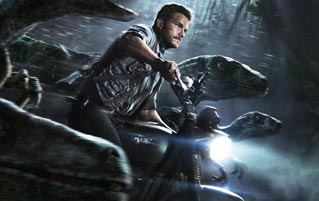
Every successful film deserves a sequel or ten. Basically, you keep going until audiences forget what the original was actually about. What was the first Fast & Furious movie, again? Something about track and field? Anger management? Then you can reboot the first, and repeat ad infinitum. But sequels can also mean trouble for the filmmakers -- you're under pressure to not only replicate the success of the original, but also find something new and innovative to do with the existing characters that'll keep the audience interested. Sometimes, the sequel itself accidentally tells you everything about the whole franchise. Like ...
The Plot Of Robocop 2 Is About Why Robocop 2 Sucks
Paul Verhoeven's breakthrough hit about corporate greed and dehumanization so thoroughly disguised its thematic depth with ultraviolence and stop-motion robots that you probably didn't even realize you were learning something about society while watching it. Sucker!
The success of RoboCop immediately compelled the studio to make a sequel. Verhoeven wasn't down for it, but they went ahead anyway and hired The Empire Strikes Back director Irvin Kershner to make RoboCop 2, which was a critical disaster. It shouldn't be any mystery why -- the clues are in the plot of the movie itself.
In RoboCop 2, the evil OCP wants to make a whole army of RoboCops, but the new models keep failing because they can't figure out why the original RoboCop worked at all -- an observation so astute that it should have been the tagline for the goddamn movie.
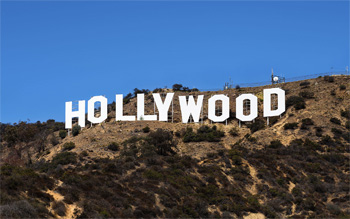
The first film's central arc was all about Murphy the Cop who is also Robo slowly rediscovering his humanity, but the sequel steamrolls all that and has RoboCop's corporate masters reprogram him as an emotionless robot again, because they (and the writers) think that a more family friendly RoboCop is what the citizens (and the audience) want. It's probably no coincidence that this movie came on the heels of RoboCop: The Animated Series.
But finally, OCP decides that what they really need is a bigger, more badass, less human RoboCop. So they stuff the brain of a dead drug lord into a giant mech warrior named (as if they couldn't make this easier for us) "RoboCop 2."
But wait, is it really a bad movie if the whole thing is a meta-commentary on why it's a bad movie? This is the whole "Jesus and the microwavable burrito" debate all over again.
Ghostbusters II Is About How Nobody Wanted To Make Ghostbusters II
Ghostbusters II is the sequel that everyone thought they wanted until they got it. The original worked because everyone was excited about making it -- the film had some weaknesses, but everybody was just so damn charming. You can tell they had a good time, and that made it a good time to watch. For the sequel, the biggest challenge was getting everyone interested with no clear direction in mind -- especially Bill Murray, who famously doesn't do sequels (seriously, it's only this and, for some reason, Garfield 2). So it's fitting that the movie itself is all about the team trying to figure out a reason to get back into the ghostbusting business.
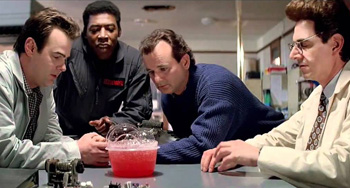
That, and the whole plot revolves around a mysterious goo that makes the cast argue relentlessly with each other, which is an accurate picture of behind-the-scenes life. At the beginning of the movie, Spengler has left the team and carved out a nice career for himself in an academic field that interests him more than playing an action hero does. In reality, Harold Ramis had mostly quit acting and gone back to his preferred career as a comedy writer. Meanwhile, Venkman is miserable. He realizes that he's been typecast, and can only find work as the host of a TV show about the supernatural -- a subject he's not especially interested in anymore. In reality, Murray had become pigeonholed into playing the same cynical comedy straight-man character, though he was interested in breaking into more serious roles.
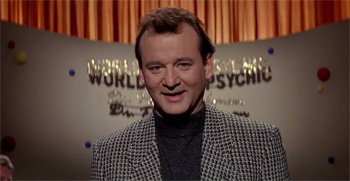
Murray, naturally, was the cast member who was least interested in returning (and would later notoriously vow to fight a third film to his dying breath), and Venkman spends most of the movie refusing to put on the suit.
Then, of course, there's Ray, the only member of the team who can't let the Ghostbusters go, and continues cosplaying as himself at kids' parties until he can convince the crew to get back together. Behind the scenes, Dan Aykroyd really was the only one who couldn't let go of Ghostbusters. (Hell, he still can't.)
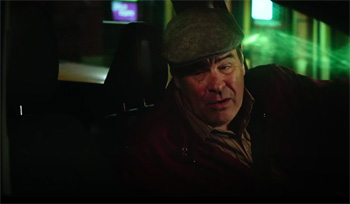
As for Winston, he existed, and presumably continued to exist. No arguing that.
The Rocky Franchise Mirrors Sylvester Stallone's Entire Career
Others have remarked before that Rocky can be seen as autobiographical. It's the story of a low-life street bum who boxes in his spare time until he takes a gamble at greatness and almost achieves it. While Sylvester Stallone was writing the script, he was being thrown out of cheap apartments for falling through on the rent, and he even took a role in a softcore porno for $200.
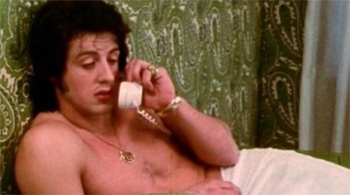
When Sly realized he had a winner with Rocky, he took a gamble, refusing to sell it at any price unless he could play the lead, and almost achieved greatness -- Rocky swept a bunch of Academy Awards, but none for Stallone himself. In fact, the full seven-film Rocky series mirrors Stallone's career, if you switch out punching for acting. Consider this:
In Rocky II, Rocky has little interest in boxing again, and goes right back to failing at everything. When his former opponent, Apollo Creed, calls their previous fight a fluke, Rocky finally agrees to get back in the ring to prove he wasn't a one-hit wonder.
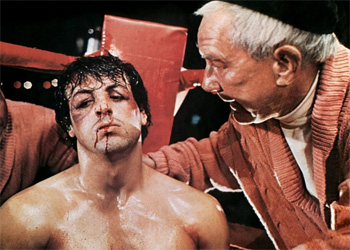
In reality, Stallone followed up Rocky by directing the flop Paradise Alley. He had to make Rocky II just to prove he could do it. Rocky III and IV are about Rocky kicking ass and not even bothering to take names, because he's flat-out too busy with the ass-kicking. He wipes the floor with both Hulk Hogan and Mr. T in the same movie, and then comes back to do the same with fortified meat-tower Dolph Lundgren. This was the '80s, when Stallone was also making the Rambo films, as well as Cobra and Tango & Cash -- the very height of his action career.
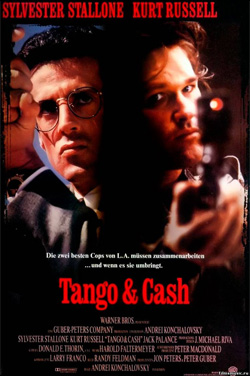
Then came Rocky V, the franchise turd. In it, Rocky gets too old for this shit, goes bankrupt, and has his title threatened by younger stars. For Stallone, this was the era of Judge Dredd, Daylight, and goddamn Stop! Or My Mom Will Shoot. By 2006, he was appearing in films only sporadically, and when he did, it was as a villain in a Spy Kids movie or the voice of a CGI ant. That's when Rocky Balboa hit theaters. There, Rocky is a completely washed-up artifact of yesteryear, but he makes one last shot at greatness and totally nails it. In reality, Stallone enjoyed a short but critically successful return to form with both Rocky Balboa and the fourth Rambo.
Finally, we have Creed, which I haven't seen, and am therefore forced to assume is all about how people haven't seen it.
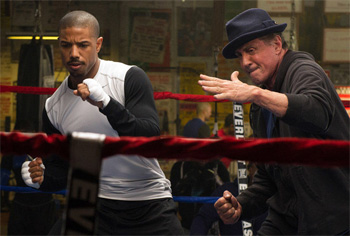
Jurassic World's Plot Is About Everything The Series Did Wrong
The whole premise of Jurassic World is that the dinosaur theme park is failing because people are sick of dinosaurs now. That's a hard pill to swallow, but it reflects the mentality of the film studio toward its own property after 2001's disastrous Jurassic Park III. JW's main antagonist -- the Indominus Rex -- is a hybrid of all the dinosaurs that elicited the best audience responses in the past. In the same way, Jurassic World is an attempt to extract the best parts of previous installments and combine them into an insane monster that will surely destroy us all.
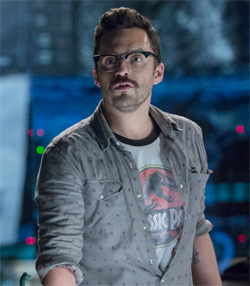
Whether or not the filmmakers realize it, what JW got right was introducing a slightly new premise and all-new characters instead of throwing Sam Neill and/or Jeff Goldblum into the jungle for a fourth time. It was never the dinosaurs that were the problem, and that's mirrored in the climax, when it's the regular old T-Rex from the original movie who defeats the Predator-Rex and saves the day.
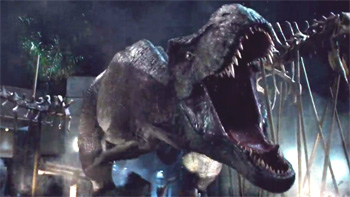
The James Bond Franchise Is A Perfect Reflection Of Hollywood's Evolution
At 24 movies and counting, the James Bond series is the very model for the long-running action franchise. Across 55 years and six different actors, this one film franchise has spanned almost the entire modern history of cinema. At first glance, you might be under the impression that all these movies are pretty much the same -- Bond travels the world, shoots a bunch of henchmen, kills the villain in some over-the-top climax, and gets the girl -- but there are some subtle ways in which the series has mirrored the changing state of Hollywood.
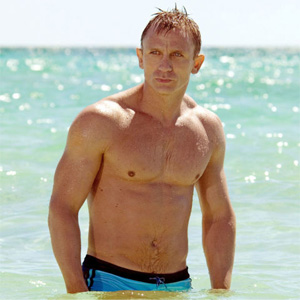
Bond started in the '60s, at the height of the Cold War. The West was seeing spies around every corner, and Hollywood was awash with secret agent thrillers like The Manchurian Candidate, The Ipcress File, and a few others. But as audience tastes evolved over the decades, Bond was also forced to evolve in order to stay relevant.
When the '70s came along and Sean Connery retired from the character, filmgoers weren't so interested in espionage and commie-whacking anymore -- they were watching things like Shaft, Foxy Brown, Dolemite, and Sweet Sweetback's Baadasssss Song. You wouldn't think that James Bond, the whitest of all superheroes, could find a way to capitalize on the Blaxploitation cinema fad, but he did -- and with vigor -- in 1973's Live And Let Die. It was Roger Moore's first outing, in which Bond fights drug dealers in Harlem and gives the middle finger to conservatives by hooking up with the first-ever black Bond girl.
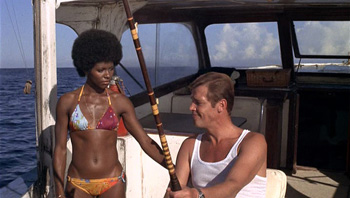
Then, in 1977, Star Wars exploded into theaters. In 1979, James Bond went into space in Moonraker. In the '80s, gritty cop thrillers were in vogue -- dramas like Miami Vice cracked down on the drug trade, and starred younger hunks. That's when Timothy Dalton came along, and Bond quit MI6 to go full Tubbs on some drug dealers in License To Kill.
GoldenEye was the first Bond film made after the collapse of the Soviet Union, an event that changed the power balance of the world, and seemingly left Bond in the lurch. We were in a new age of more progressive politics, so Bond morphed into Pierce Brosnan and his boss, M, was replaced by a woman -- one that had no qualms telling Bond he was "a sexist, misogynist dinosaur -- a relic of the Cold War."
Arguments against Bond are older than some people making them.
Since the mid-2000s and Batman Begins, we've been living in the era of the serious reboot. Fittingly, we have a new Bond, Daniel Craig, who not only reboots Bond the character, but also Bond the series. The entire tone is far more serious now. And they lampshade this like crazy; in Skyfall, Bond is introduced to the new Q, the gadget master, who hands him nothing but a gun and a radio. To the disappointed Bond, he asks, "Were you expecting an exploding pen?"
Then Spectre introduced the Bond cinematic universe, so look forward to Q: A James Bond Story and Age Of Moneypenny.
Jeremy Herbert is a Sagittarius, attempted filmmaker, and fan of loud shirts. He writes about movies with the regularity of a national holiday on his blog, WhoSpilledMyPopcorn.Wordpress.com, and tweets slightly more often at @DDayFilms.
Also check out 5 Insane Sequels That Almost Changed Movie History and 7 Beloved Movies You Never Knew Had Hilarious Insane Sequels.
Subscribe to our YouTube channel, and check out 5 Movie Epilogues That Should Have Been Sequels, and other videos you won't see on the site!
Follow us on Facebook, and we'll follow you everywhere.